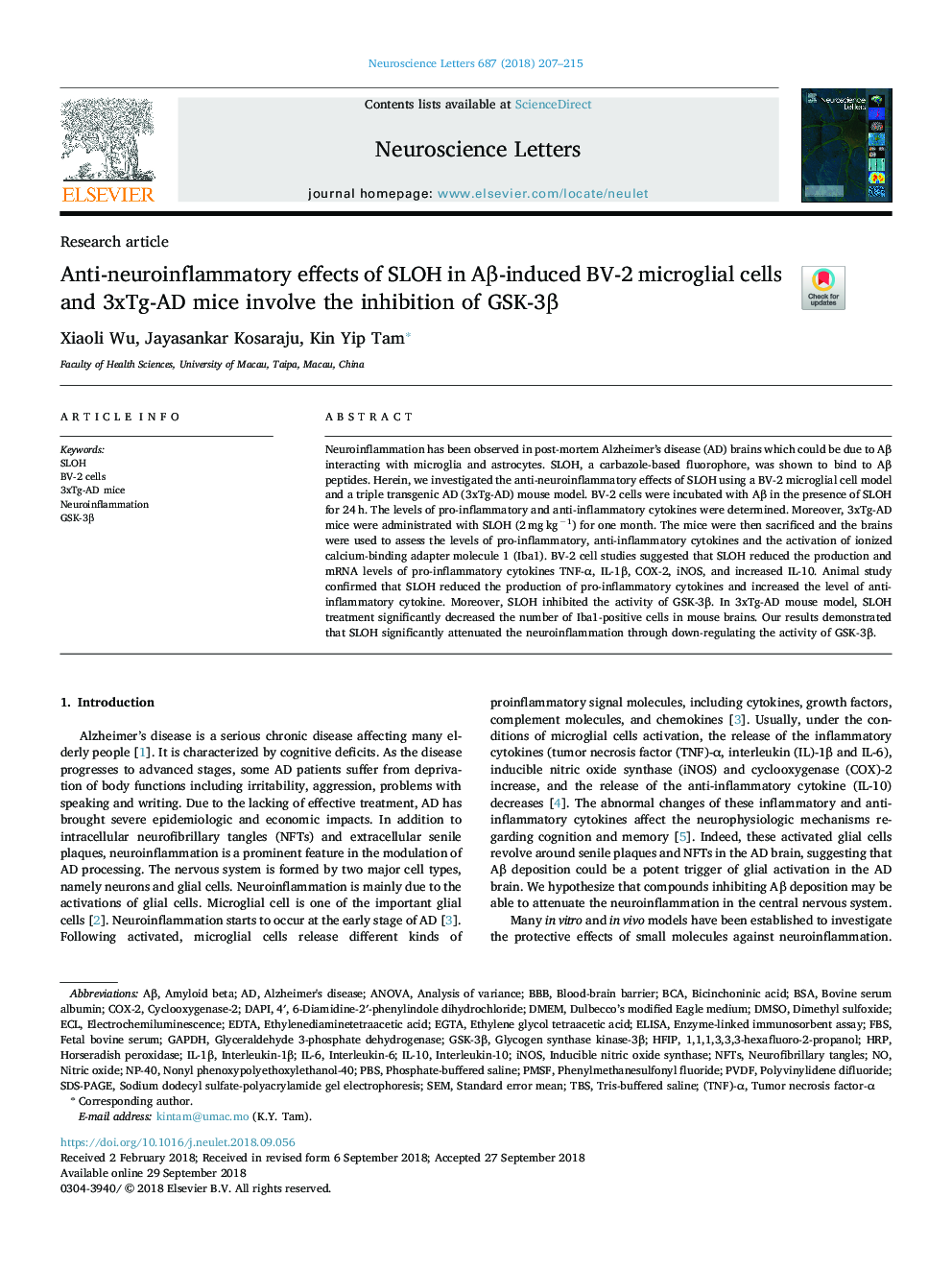| Article ID | Journal | Published Year | Pages | File Type |
|---|---|---|---|---|
| 11033433 | Neuroscience Letters | 2018 | 9 Pages |
Abstract
Neuroinflammation has been observed in post-mortem Alzheimer's disease (AD) brains which could be due to Aβ interacting with microglia and astrocytes. SLOH, a carbazole-based fluorophore, was shown to bind to Aβ peptides. Herein, we investigated the anti-neuroinflammatory effects of SLOH using a BV-2 microglial cell model and a triple transgenic AD (3xTg-AD) mouse model. BV-2 cells were incubated with Aβ in the presence of SLOH for 24â¯h. The levels of pro-inflammatory and anti-inflammatory cytokines were determined. Moreover, 3xTg-AD mice were administrated with SLOH (2â¯mgâ¯kgâ1) for one month. The mice were then sacrificed and the brains were used to assess the levels of pro-inflammatory, anti-inflammatory cytokines and the activation of ionized calcium-binding adapter molecule 1 (Iba1). BV-2 cell studies suggested that SLOH reduced the production and mRNA levels of pro-inflammatory cytokines TNF-α, IL-1β, COX-2, iNOS, and increased IL-10. Animal study confirmed that SLOH reduced the production of pro-inflammatory cytokines and increased the level of anti-inflammatory cytokine. Moreover, SLOH inhibited the activity of GSK-3β. In 3xTg-AD mouse model, SLOH treatment significantly decreased the number of Iba1-positive cells in mouse brains. Our results demonstrated that SLOH significantly attenuated the neuroinflammation through down-regulating the activity of GSK-3β.
Keywords
COX-2PVDFHFIPEGTAAβGAPDHTBSGSK-3βHRPNP-40BCAiNOSDAPIPMSFECLIL-1βIL-10PBS3xTg-AD miceIL-6BV-2 cells(TNF)-αDMEMNFTsFBS1,1,1,3,3,3-hexafluoro-2-propanolBSADMSODulbecco’s modified Eagle mediumbovine serum albuminEDTAethylene glycol tetraacetic acidEthylenediaminetetraacetic acidNeuroinflammationsodium dodecyl sulfate-polyacrylamide gel electrophoresisSDS-PAGEElectrochemiluminescenceInterleukin-10interleukin-6Interleukin-1βamyloid betabicinchoninic acidAlzheimer's diseaseanalysis of varianceANOVATris-buffered salineELISAEnzyme-linked immunosorbent assaytumor necrosis factor-αstandard error meanpolyvinylidene difluorideDimethyl sulfoxideBBBfetal bovine seruminducible nitric oxide synthaseCyclooxygenase-2Phenylmethanesulfonyl fluorideBlood-brain barrierPhosphate-buffered salineSEMneurofibrillary tanglesNitric oxideHorseradish peroxidaseglyceraldehyde 3-phosphate dehydrogenaseGlycogen synthase kinase-3β
Related Topics
Life Sciences
Neuroscience
Neuroscience (General)
Authors
Xiaoli Wu, Jayasankar Kosaraju, Kin Yip Tam,
